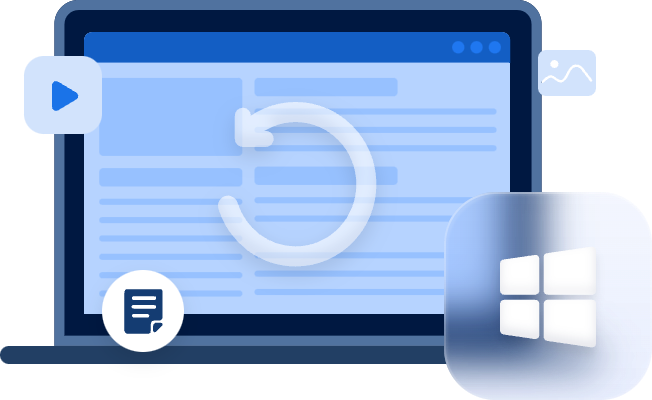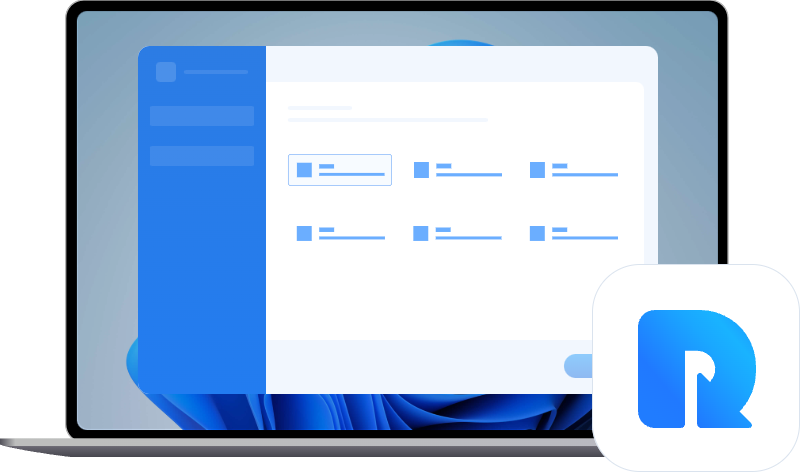Mastering Laptop Overheating: A Comprehensive Guide
This article offers an in-depth exploration of various methods to address the common issue of laptop overheating. It includes detailed steps for effective cooling, software tweaks, hardware checks, and introduces MyRecover for safeguarding data.
Does your laptop feel like it's about to take off with the amount of heat it generates? You're not alone. In this expansive guide, we delve into the nitty-gritty of how to fix an overheating laptop. From practical cooling methods to software tweaks and hardware maintenance, we've got you covered. Plus, we'll introduce you to MyRecover, a tool that ensures your data remains safe, even when your laptop's temperature is rising.
Why Does Your Laptop Overheat?
Environmental Factors: Poor ventilation, high room temperature, and using the laptop on an insulating surface can contribute to overheating.
Internal Dust Accumulation: Dust and debris can clog the cooling fans and air vents, hindering proper heat dissipation.
Aging Components: Over time, components like batteries and fans can wear out, reducing their efficiency in cooling the system.
Resource-Intensive Tasks: Running demanding applications like video editing software or games pushes your laptop's hardware, generating more heat.
Effective Cooling Strategies
1. Master the Art of Cleaning
Step 1: Power off and unplug your laptop.
Step 2: Use a can of compressed air to blow dust out of vents and cooling fans. Keep the can upright to avoid moisture.
Step 3: For a deep clean, open the laptop's back panel (if you're comfortable) and gently clean the fan blades and heat sink.
2. The Cooling Pad Advantage
How to Choose and Use:
Step 1: Pick a cooling pad with high airflow and compatibility with your laptop's size.
Step 2: Connect the cooling pad to your laptop, ensuring the fans align with your laptop's intake vents.
Step 3: Use the cooling pad consistently, especially during heavy laptop use.
3. Optimize Your Workspace
Workspace Arrangement Tips:
Tip 1: Always use your laptop on a hard, flat surface to promote air circulation.
Tip 2: Avoid using your laptop on a bed, couch, or other soft surfaces that can obstruct air vents.
Tip 3: Elevate the rear of your laptop slightly to enhance airflow under the device.
Software Optimizations for Cooler Operations
1. Tackle Malware and Bloatware
Scanning and Removing Unwanted Software:
Step 1: Install a reliable antivirus and anti-malware program.
Step 2: Perform a full system scan to detect and remove any malicious software.
Step 3: Uninstall unnecessary or rarely used software to reduce CPU load.
2. Keep Your System Up-to-Date
Updating Process:
Step 1: Regularly check for and install updates for your operating system, drivers, and BIOS.
Step 2: Follow safe updating practices, such as backing up important data before a BIOS update.
Step 3: Reboot your laptop after updates to ensure changes take effect.
3. Optimize Your Settings and Usage
Effective Configuration:
Step 1: Adjust your power settings to a balanced or power-saving mode.
Step 2: Monitor and close resource-heavy applications when not in use.
Step 3: Reduce screen brightness and disable unnecessary startup programs.
Diving Into Hardware Maintenance
1. Refreshing the Thermal Paste
Replacing Thermal Paste:
Step 1: Gently disassemble your laptop to access the CPU and GPU.
Step 2: Clean off the old thermal paste using isopropyl alcohol.
Step 3: Apply a pea-sized amount of high-quality thermal paste and reassemble.
2. Fan Inspection and Maintenance
Fan Care Guide:
Step 1: Open the laptop to access the fans, ensuring you're grounded to avoid static damage.
Step 2: Inspect the fans for damage and clean them using compressed air.
Step 3: If a fan is damaged or not spinning, consider replacing it.
3. Upgrading for Efficiency
Hardware Upgrade Recommendations:
Recommendation 1: Increase RAM to decrease reliance on the hard drive, which can get hot.
Recommendation 2: Switch to an SSD, as they generate less heat than HDDs.
Recommendation 3: Replace an old or swollen battery which could be a heat source.
How to Fix Overheating Laptop
Despite following the above steps, if your laptop still overheats, consider these additional actions:
Minimize CPU and GPU Stress: Limit the maximum processor state in your power settings.
Regular Ventilation Checks: Ensure nothing is blocking the laptop's air intake or exhaust.
Seek Professional Assistance: If the problem persists, a technician can provide expert help.
MyRecover: Safeguarding Your Data Amidst the Heat
When laptops overheat, data loss can be a real concern. Enter MyRecover:
MyRecover Features:
Versatile Recovery Options: Supports a wide range of file formats and storage devices.
Secure Recovery Process: Ensures no further damage or data loss during recovery.
Using MyRecover:
Step 1: Install MyRecover from a trusted source.
Step 2: Select the target drive for scanning.
Step 3: Review the recoverable files and select those you need.
Step 4: Save the recovered files to a safe location, different from the original path.
Conclusion
Addressing laptop overheating is a multi-faceted process involving meticulous cleaning, software fine-tuning, and hardware care. With these comprehensive steps and regular maintenance, your laptop's performance and lifespan can significantly improve. And don't forget, in the event of data loss, MyRecover is your go-to tool for safe and efficient recovery.
FAQs
How often should I clean the inside of my laptop to prevent overheating?
Aim for a thorough cleaning every 6 to 12 months, depending on your usage environment.
Can upgrading to an SSD really help with overheating?
Yes, SSDs generate less heat than HDDs due to their lack of moving parts, contributing to better overall thermal management.
Is it safe to use third-party cooling pads for laptops?
Yes, as long as the cooling pad is compatible with your laptop's size and design, it's a safe and effective way to enhance cooling.
How does reducing screen brightness help with overheating?
Lower brightness reduces the power consumption of the display, indirectly helping in heat management.
When should I consider professional help for an overheating laptop?
If you've tried the above steps and the overheating persists, it's time to consult a professional technician for a deeper inspection and possible repairs.


